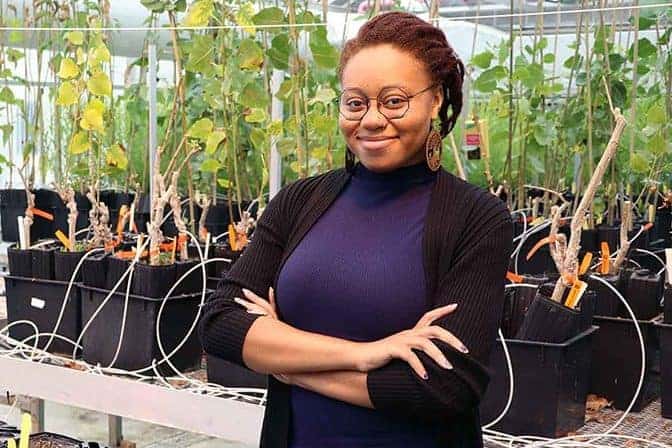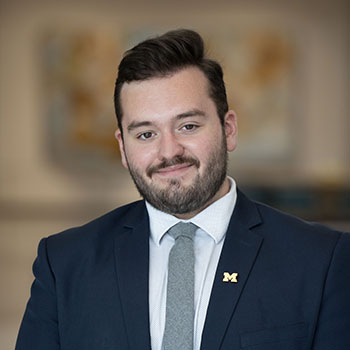
Striving for Equity in Water Access is a Personal Commitment for CEE Student
PhD student Brittany Hicks’ experiences inspire her research

PhD student Brittany Hicks’ experiences inspire her research
CEE PhD student Brittany Hicks’ research on microbiology and water chemistry is inspired by her personal experiences and her desire to connect her work with her passion for community engagement. This commitment drives her focus on her dissertation, as well as other projects in which she is involved.
“I believe research should be accessible to everyone, and I believe that research is something to be done in partnership with everyone at the table,” Hicks said. “I am driven to this work because I recognize that I am not simply an academic, but I am a community member.”
Hicks, who is majoring in environmental engineering, examines opportunistic pathogens and how they grow within oversized drinking water distribution systems. Opportunistic pathogens are bacteria that typically do not infect healthy people, but can cause those with compromised immune systems to become more susceptible to potentially dangerous infections such as pneumonia or eye infections, for example. This issue is gaining in importance, given the widespread exposure to Covid-19 and the ongoing health complications often found in people who have battled it.

“These types of drinking water systems we’re examining are what you would see in typical legacy cities, with legacy cities being places such as Flint and Detroit, where peak populations happened sometime between the 1950s and 1970s,” Hicks said. “Legacy cities have experienced a population decline, and so ultimately, with that population decline, there are regions within their drinking water distribution systems where water stagnates. As water remains in the system for a long time, the level of disinfectant decreases, and the potential for pathogens to regrow increases.”
Hicks said she is trying to understand what the distribution of community acquisition of community-acquired illness looks like for certain respiratory pathogens. Then, examining within a particular geographic area, she will compare that data to the hydraulic dynamics of the water distribution system by locating the high water age regions.
“Then, I will layer that on top of understanding regions that have historically experienced high levels of segregation, and historical redlining,” Hicks said. “I am trying to assemble these three different pieces together to see the relationships among segregation, community-acquired illness and water age. I am asking if there are particular dynamics within the water distribution system that are increasing the types of pathogens that we’re seeing to cause respiratory illness. If we’re in regions that have been historically segregated, we’re trying to bridge different types of data and information to understand the story more holistically. I think weaving this information together is new, because I don’t think it’s been looked at as heavily on the engineering side, even though there has been work in this area on the public-health side, with geography and other factors.”
In addition to her dissertation research, Hicks’ work appeared in April 2023 with co-authors CEE Prof. Nancy Love and a team of other researchers in The Lancet, highlighting “The effects of racism, social exclusion, and discrimination on achieving universal safe water and sanitation in high-income countries.” The researchers noted that structural inequalities, racism, climate change, insufficient investment, poverty, housing instability and other systemic issues have produced gaps in access to clean drinking water. They have issued a call for governments around the world to meet an obligation to provide sanitary water for all residents.
“It is a privilege to work with and learn from Brittany,” said Prof. Love, the Borchardt and Glysson Collegiate Professor and Joann Silverstein Distinguished University Professor. “She has an excellent research committee supporting her in the work, and I am confident that her work will bring new insights that inform solutions around water and legacy cities.”
Hicks also recently assembled a workshop that highlighted important issues surrounding equity in water access. “We find that there are consistent gaps with access to proper water quality, access to proper sanitation for certain groups of people, and it tends to affect people across certain racial lines or across certain levels of socioeconomic status and groups, such as homeless populations and prison populations,” Hicks said.
“I think there needs to be a clear understanding of the harm that’s been done to groups and communities, and we need to make intentional efforts to reestablish trust and redistribute power, so that those who have been systematically disenfranchised have a pathway to developing solutions,” she added.
Hicks noted that many communities are already aware of the problems that exist and their own need to help resolve them, so providing resources to support and accommodate those remediation processes is important.
Her empathy for communities facing water access challenges comes from her personal experiences. “I think I recognize within my own family how difficult it is to not trust your water,” Hicks said. “I recognize the amount of burden it places on a family–financially, mentally, and emotionally–to have to make other decisions because of that lack of trust. I understand what it looks like not to be sure where to find answers when it comes to your drinking water. It was important for me to really understand technically what’s going on, so that I could better support my own community, and I’m realizing that my own community challenges are not limited to rural Georgia, where I grew up.”
Hicks noted that her experiences have led her to approach her work in “a very different way, that’s empathy-based and individual-centered.” Hicks added that public access and transparency of information are key to providing data that residents need to make decisions. “We work with people who are from the city that we’re working in, and we develop these reports together to make sure that they’re understandable, and we make sure that we’re communicating. So there is a lot of intentionality about language and reporting, and a lot of it’s giving people information directly, and then finding ways to present that information in public spaces where anyone can ask questions and share. I think there’s room to grow and explore the way we do that.”
Hicks believes her connection to the human experience is key when conducting her research. “When I share my lived experiences, and then I go into an academic space, I get to learn about others’ lived experiences. These spaces are not separate from the community. When I am in the academic space, I get to bring other community members with me.”

Marketing Communications Specialist
Department of Civil and Environmental Engineering